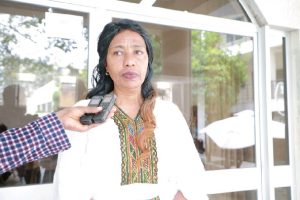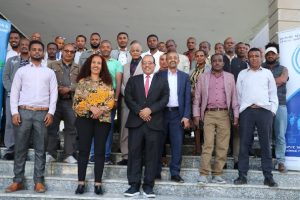
During the second series of the Horn Dialogue which held in Addis Ababa last Friday, statements of senior diplomats and foreign relation experts were dominantly about concerns showing the rising insecurity in the Horn of Africa (HoA).
Almost all panellists and officials participated in the dialogue highlighted both internal and regional factors exacerbating the situation.
Harry Verhoeven, International Relations Scholar with Columbia University, emphasized the complex nature of insecurity in the region, attributing it to a mix of internal political conflicts and regional tensions. He noted that while the proximity between Horn of Africa countries has unifying effects, shared identities, customs, and traditions, challenges are being continued due to underutilization of the opportunities.
One common thread across the region is the deep interconnection between countries’ societal values, despite disparities in their their political policies and approaches to security, he said.
The absence of formal regional integration mechanisms has been identified as a significant gap. In spite ofpotentials for overcoming challenges through shared history and geographical proximity, undesirable struggles are continued. Disagreements within regional countries, even over regional organizationsfurther complicate efforts to address peace and security issues effectively, according to him.
To navigate these challenges, experts underscore the importance of revitalizing regional organizations like IGAD and limiting destabilizing external interventions. They emphasize the need for leadership that recognizes the interests and insecurities of all regional players, fostering cooperation and collective action. However, concerns persist about the impact of hegemonic geopolitics, which may hinder the military growth of other states in the region, prolonging insecurity.
SemirYesuf (PhD), a Senior International Security Analyst, echoed concerns about competitive dynamics within the Horn of Africa, highlighting tensions fuelled by involvement from Middle Eastern, Western, and Eastern powers. The prevalence of internal conflicts in the region provides opportunities for external actors to engage in proxy warfare, further complicating efforts to achieve peace and stability, according to him.
Semir stressed the importance of addressing the root causes of conflicts through dialogue and cooperation among Horn of African countries.
The ongoing tensions within countries like Ethiopia, Sudan, South Sudan, and Somalia needs urgent internal resolution on governance crises, demilitarization of civil issues, and mitigation of power struggles.
Another foreign relation expert and senior diplomat, Ambassador John Gai of South Sudan underlined the necessity of building fraternity with regional neighbours for common development goals. Heemphasisedthe importance of mutual understanding and collaboration.
Addressing insecurity in the Horn of Africa requires a multifaceted approach that acknowledges the complex interplay of internal and regional factors. Regional organizations must be empowered to facilitate dialogue and negotiations, he added.
During the opening of the dialogue, Ethiopian Foreign Affairs State Minister, Ambassador MisganuArega also remarked that regional integration needs to be facilitated by all regional countries.
Ethiopia is struggling against terrorism and illicit trade that exacerbates the insecurity and political instability. Maritime security and terrorism fighting needs the involvement of all states across the region, he remarked.
BY YESUF ENDRIS
THE ETHIOPIAN HERALD SUNDAY EDITION 21 APRIL 2024





